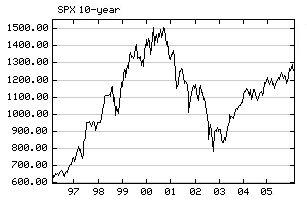Leave Your Equity Alone!
Thursday, February 09, 2006
Just when we were set to write something good about Money Magazine, they come along and do this. The nation's number one personal finance magazine, having months ago stopped their incessant cheerleading for the housing bubble and having recently featured a number of very good stories about the perils of too much debt and the downside to real estate, seems to have reverted to their old bad habits.
In the February issue, with the apparent blessing of a senior staff reporter, two certifiably nutty financial planners from San Diego have recommended that a house-rich Los Angeles family borrow hundreds of thousands of dollars against their home to invest in stocks so that they can "catch up" in their retirement savings.
Please, somebody find these people and tell them to leave their equity alone!
The story is titled Cashing in on hot real estate, and just seeing the phrases "cashing in" and "real estate" should set off alarm bells inside your head. You see, in today's twisted world of contemporary personal finance, otherwise known as "more prosperity through more debt", many would have you believe that by borrowing money you are cashing in.
You see, in today's twisted world of contemporary personal finance, otherwise known as "more prosperity through more debt", many would have you believe that by borrowing money you are cashing in.
Borrowing money is not cashing in.
Selling your Los Angeles home for a million dollars, then moving to New Mexico, and buying the same house there for $250,000 - that's cashing in.
Then you'd have the same house and a half a million dollars in cash. If you don't sell the house, all you're doing is borrowing more money. Got it?
We've heard this prosperity through debt rationale many times before, most notably from a Citibank representative about a year ago who referred to "untapped home equity" as "dead money". That is, dead money just sitting there waiting to be put to work by investing in more real estate.
It was disgusting to hear then, and hearing the same theory applied to the purchase of equities today is only slightly less appalling (or maybe more appalling - not much thought has been given to the relative evil of these two).
Prosperity through debt, leveraged speculation for the masses - the Greenspan legacy.
So, the Handel-Laports of Silverlake own a $1 million home on which they carry a $250,000 adjustable rate mortgage which they need to refinance because it's about to adjust.
They unwittingly timed the market perfectly by purchasing in 1995, and along with a few million other Angelenos, they've hit the L.A. lotto.
Bravo. What now?
They seem to be a little behind in their retirement savings having accumulated only $100,000 to date. With a combined income of $120,000, and $42,000 in home equity and credit card debt, the mid-forties couple needs to start getting serious about retirement savings.
But how?
They are "risk-averse when it comes to playing with the stability" of their lives, yet they have all that equity in their house. How are they going to get enough money into those retirement accounts to live a life of leisure down the road.
By saving?
No. The certifiably nutty financial planners would have the Handel-Laports join the ever increasing number of medicated Americans by ratcheting up their debt to a cool half million dollars, increasing their monthly debt service, and taking their chances with U.S. and foreign equities.
The Handel-Laports could potentially add a couple more warm bodies to the growing pharmacy lines for what seems to be an insatiable desire for sleeping pills to go along with all the debt that Americans have been accumulating in recent years.
The financial planners argue that the Handel-Laports can "convert equity that might melt away" and still have a sizeable equity cushion even if the real estate market drops by 30 percent. A better metaphor would really be "open a $200,000 margin account".
And, in case the Handel-Laports are not already aware of this, someone should tell them that in the 1990s real estate prices declined by over 40 percent in many parts of Los Angeles and that the 1990s real estate bubble was just a baby bubble compared to what has developed in recent years.
The 1990s decline played out over a period of about six years, and you're planning to sell when? In "five to seven years". Oh.
It is understandable that Money Magazine would have a sort of happy bias toward equities since mutual fund companies are their core advertisers, but this advice crosses the line. A constant barrage of overt and subliminal coaxing to buy equities is the price that subscribers pay for getting generally good personal finance advice at a generally low cost, but, since the technology stock bubble burst and real estate took off a few years ago, Money Magazine seems to have been adrift.
A constant barrage of overt and subliminal coaxing to buy equities is the price that subscribers pay for getting generally good personal finance advice at a generally low cost, but, since the technology stock bubble burst and real estate took off a few years ago, Money Magazine seems to have been adrift.
So, let's see how many ways this could turn out badly.
Figuring that the tax break on the interest for the borrowed money roughly offsets the taxes paid on the money earned, the Handel-Laports would have to earn more than six percent on the invested money to come out ahead.
How do you do that?
You can't do it with any sure-fire investment, since treasuries pay a mere 4.5 percent and quality corporate debt is not that much higher. The house-rich family would have to take on more risk in order to make this gambit succeed.
But didn't they already make clear that they are "risk averse"?
With the suggested asset allocation, the Handel-Laports could earn five, ten, or fifteen percent per year and, coming off of an eighteen year bull market in stocks, they could just as easily lose the same amount over the same period.
If their investments gained ten percent a year for six years, they would pocket the four percent per year difference putting them about $50,000 ahead after six years.
If their investment return was zero (which is about the result they would have gotten if they had done this six years ago), they would be out the interest paid, or roughly $50,000.
And, of course, in the event that stocks have difficulty in the next six years, heading back down to their historical mean losing, say, five percent per year, then they would be behind by over $100,000.
That is, assuming that the interest rate on their new $500,000 ARM doesn't go up.
So, Mr. Handel and Ms. Laport, are you feeling lucky?
If so, stock up on your sleeping pills.
For previous posts about Money Magazine, use the Search Bar at the top of the page, this link, or use the links below:











![[Most Recent Quotes from www.kitco.com]](http://kitconet.com/charts/metals/gold/t24_au_en_usoz_2.gif)
![[Most Recent Quotes from www.kitco.com]](http://kitconet.com/charts/metals/silver/t24_ag_en_usoz_2.gif)
![[Most Recent USD from www.kitco.com]](http://www.weblinks247.com/indexes/idx24_usd_en_2.gif)

14 comments:
maybe SNL can do a similar skit like this one on home equity:
http://www.salon.com/ent/video_dog/comedy/2006/02/06/debt/index.html
(just click free to play video)
"Neither borrower nor lender be"
Who said that?
I read "Irrational Exuberance" for the first time recently, and he identified this rosy view that equities, even if they drop sometimes, always go back up over 5-10 years. He noted that it seems ingrained now in not just the press, but large numbers of financial professionals, an ignorance of reality which would be more understandable if the long-term data on stock prices wasn't so freely available.
However, this Money magazine story has been around for a while on the blogs, and I've yet to see a single complimentary comment on it.
I need a home equity loan to make my payment
If the price of your house goes up while everyone else's stays. This is good. Then, you can trade and extract equity for other purposes without further debt. If price of everyone's house goes up, then cost of housing just went up. This is bad. That we are contented by this situation makes it a candidate for the greatest swindle in all history.
The launch of Zillow.com is an interesting aside to the housing bubble - and aims for the co-conspirator real estate brokers.
To the local knowledge crowd: Local knowledge matters, but don't overstate the importance of on the ground knowledge. What is local knowledge anyway? It is all the information the he will gradually amalgamate and that mosaic will paint a much better picture of the local community than you get from a man on the street testimonial from a non partisan broker. So far the broker has played duel roles, sales and analyst, sans the analysis but heavy on anecdote.
This appears to be a backstop service and will negate some of the information asymmetry in the market. This service will help inform the basic laws of supply and demand. Really, how well do you know a neighborhood by driving around a few times and listening to a broker tells you how great the schools are? Give me a one pager with relative comparisons and some local anecdotes and I suspect you would have an equal or better feel.
The necessity of the information and commensurate transparency is long overdue. This service is so logical: a more efficient allocation of real estate commission dollars.
This information gathering exercise is only a pathway to disintermediation of the commission structure. How that ultimately happens I don’t think he even knows. But with that much money in play it seems inevitable.
You forgot to calculate in the long-term effects of the closing costs for that $500K refi.
On a different note:
Has anyone noticed how the RE industry is slowly changing their tune from a seller's maket to a buyer's market? What amazes me is that after some areas posted 60-100% increases in price over the last several years and all of a sudden there are more homes for sale at the peak of this bubble, it's now considered a buyer's market because the upward biddings have stopped?!? I have to say, there's just no end to this foolishness encompassing the real estate market. Just like there are too many financial planners in our nation, there are now too many real estate brokers running around preaching the same BS!
HD
chubbyray: its the not greatest swindle at all.
the british kings were notorious with messing with prices, scales, measurements , on and on. nothing new here.
The real estate market is dead, not flat.
The same houses stay on the market month after month. Nobody is buying. A new building sits empty, for sale, and no takers. A new strip development sits empty, no renters.
It is not a sellers market. It is not a buyers market. It's a dead market.
A few new houses built does not a market make. It does make a great tax base for local governments to raise property taxes on every dwelling in town. Government at all levels never cease to increase spending, raise fees, raise rates for water and sewage, ad nauseum. It is the biggest scam and con the world will ever see. Good for bondholders, bad for the average tax slave. You're being used and abused.
It's not going to stop until it crashes. Everybody will be dumbfounded and wonder what went wrong. When it does, and it will, it is going to hurt. It can't be sustained.
How about selling the property. Get rid of all debt, rent a nice place. Invest the money in a diversified portfolio
David
Bubble Meter Blog
Just my 2c. The grand con is that people believe they benefit from rising house prices.
Yeah, I'm benefiting from increasing home value...I get to pay more in taxes. Everyone knows that increasing the tax increases the quality of the services provided by the government. I'm so happy......
Zonie
You can borrow against your home at a rate of 1.5 - 2.5%. You have a negative depreciation of about 4%
If you can't invest with an annual return of over 6% for a 10 year period- your an idiot. (not to mention appreciation over that same period)
That is what they mean by equity being "dead money"
Real Estate is not dead, those who have good credit and some $$ are making a killing. It's a rich get richer phase now.
Post a Comment